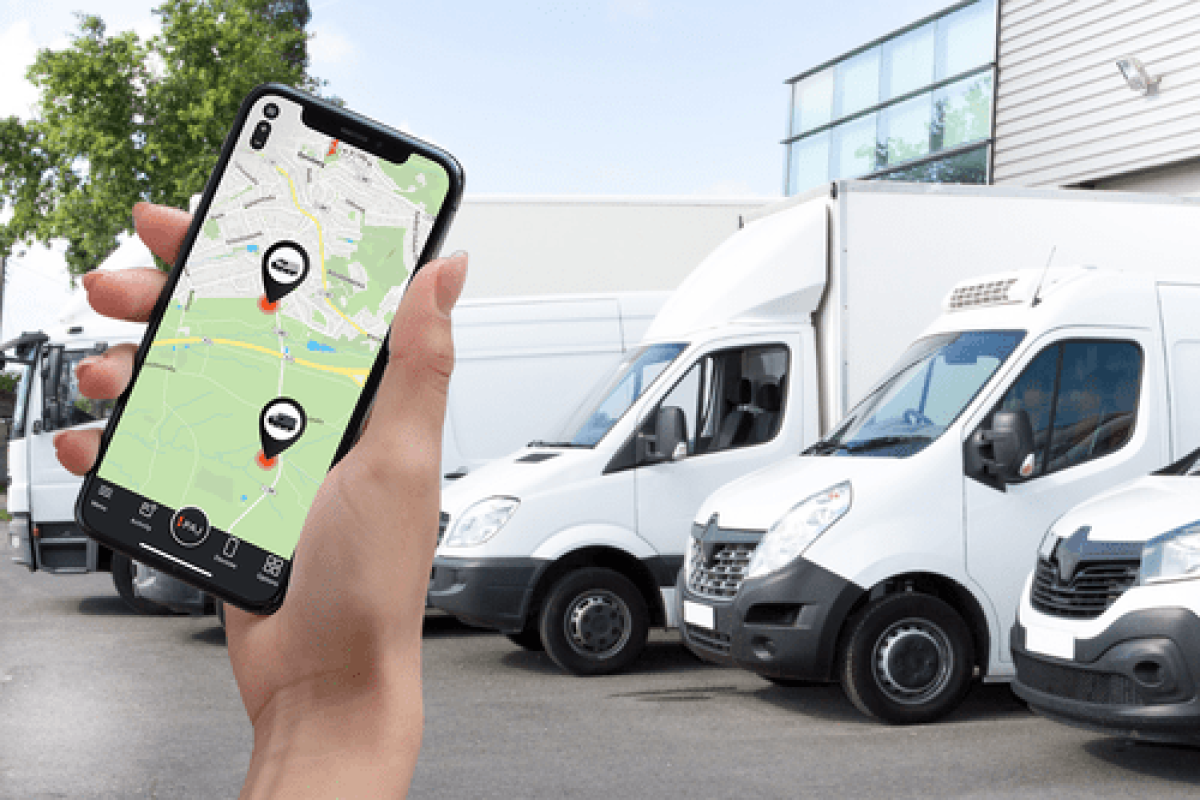In today’s competitive market, advanced truck tracking devices for commercial vehicles have become a game-changer. These devices do more than just track locations, they enhance fleet security, optimize operations, and boost efficiency.
For businesses managing a fleet, commercial GPS tracking offers a simple yet powerful way to stay ahead.Whether you’re managing a small fleet vehicle or overseeing a large operation, understanding the benefits of GPS tracking is crucial.
In this guide, Traxxis GPS Solutions will walk you through what GPS trackers are, how they work, and whether implementing one is the right choice for your business.
What is a GPS Tracker for Commercial Vehicles?
A GPS tracker for commercial vehicles is a device that uses data from global positioning satellites to establish a vehicle’s current location. This data is relayed to a central system via cellular networks, allowing businesses to monitor their fleets remotely using a gps tracking platform via mobile app or web-based platform.
Types of GPS Trackers
Depending on your fleet’s requirements, you can choose from the following types:
Plug-in GPS Trackers:
These devices connect directly to a vehicle’s OBD-II port, making them simple to install. They are widely utilized in light commercial cars and provide insights into engine diagnostics.
Hardwired GPS Trackers:
Installed directly into the vehicle’s electrical system, these trackers are suitable for bigger fleets that require steady power. They are tamper-proof and provide dependable tracking even in tough conditions.
Portable GPS Trackers:
These trackers are battery-powered and lightweight, making them ideal for temporary installations or GPS tracking assets such as trailers that do not have a consistent power source.
Technologies Used in GPS Trackers
GPS tracking devices rely on:
Satellite Tracking: Locates vehicles utilizing GPS satellites, ensuring accuracy even in remote places.
Cellular Networks: Enables data transmission to centralized systems for real-time monitoring.
Geofencing: Fleet tracking devices alerts fleet managers when a vehicle enters or exits a predetermined region, enhancing security and compliance.
Key Benefits of GPS Trackers for Commercial Vehicles
Integrating GPS trackers into your fleet management strategy offers numerous benefits that go beyond simple location tracking:
1. Enhanced Security and Theft Prevention
Vehicle Recovery: GPS trackers provide exact position data to help recover stolen automobiles.
Geofencing Alerts: Notify management when cars leave approved regions to avoid unauthorized use.
2. Improved Fleet Efficiency
Route Optimization: With real-time traffic data, dispatchers may create routes that are faster and more fuel efficient.
Reduced Fuel Costs: Monitoring idle times and harsh acceleration can cut fuel usage by up to 20%.
Efficient Scheduling: GPS trackers help allocate resources effectively, ensuring timely deliveries.
3. Driver Behavior Monitoring
- Measure measures including speeding, forceful braking, and excessive idling.
- Provide actionable feedback to increase safety and prevent accidents.
- Use reward systems to incentivize excellent driving practices.
Who Can Benefit from GPS Trackers?
GPS trackers, especially truck GPS trackers, provide solutions for a variety of industries, making them important to any firm that relies on commercial vehicles. Whether you run a small service firm or control a national transportation network, these devices can change the way you work and thrive.
Let’s take a closer look at who will profit the most:
1. Fleet-Based Businesses
GPS tracking is used in industries such as logistics, transportation, and delivery services.
- Optimize routes for on-time delivery.
- Provide customers with reliable ETAs.
- Save money by minimizing delays and fuel waste.
Example:
A regional transportation company that used GPS tracking experienced a 20% reduction in delivery delays and an increase in customer satisfaction.
2. Service Providers
Companies that provide HVAC, plumbing, or electrical services rely on timely and effective delivery. GPS trackers contribute by:
- Allowing dispatchers to find the nearest available technician.
- Reducing customer wait times.
- Improving service response times to increase customer loyalty.
3. Small to Large Businesses
Small Fleets:
Even organizations with only one or two vehicles can use GPS trackers to optimize operations and ensure vehicles are used responsibly and efficiently.
Large Fleets:
Enterprises that manage hundreds of cars benefit from centralized monitoring, route planning, and thorough reports, which allow for more informed decision-making at scale.
How to Choose the Right GPS Tracker
Choosing the appropriate GPS tracker for your fleet can be stressful, especially with so many alternatives on the market. The following are the essential considerations to consider before making your decision:
1. Assess Your Fleet’s Coverage Needs
Local Operations:
If your fleet operates primarily within a city or state, a tracker that uses cellular networks for real-time updates is sufficient.
Remote or Rural Areas:
Fleets operating in remote regions may require GPS trackers with satellite communication capabilities to ensure consistent tracking, even where cellular coverage is unreliable.
Cross-Border Operations:
For fleets that operate internationally, choose a GPS tracker with global coverage and multi-network compatibility to avoid service interruptions.
2. Consider Ease of Installation
The type of GPS tracker you select will also depend on how it is installed.
Plug-and-Play Trackers:
These link to the vehicle’s OBD-II port and are simple to install without professional assistance. Ideal for small fleets or temporary tracking purposes.
Hardwired Trackers:
These trackers, which are installed directly into the vehicle’s electrical system, are more secure and tamper-resistant, making them perfect for bigger fleets or high-value vehicles.
Portable trackers:
These battery-powered devices are ideal for non-vehicle assets such as trailers or for temporary tracking.
3. Review Pricing and Scalability
GPS trackers come with varying price points based on features and capabilities. To make the most of your investment:
Compare Costs:
Factor in the upfront cost of devices, installation fees, and ongoing subscription charges for data transmission and software.
Check Scalability:
Ensure the system can scale with your fleet’s growth. For example, some providers offer flexible pricing based on the number of vehicles tracked.
Evaluate ROI:
Consider long-term savings in fuel, maintenance, and operational efficiency against the initial investment.
Traxxis GPS: Trusted Solutions for Commercial Vehicles
Traxxis GPS is a trusted leader in fleet management, providing customized solutions to match your company’s needs. Here’s why businesses from many industries choose Traxxis GPS Solutions:
Customizable Solutions: GPS vehicle tracking systems for various fleet sizes.
Exceptional Customer Service: Dedicated assistance assures a smooth setup and continued reliability.
Proven Reliability: Used by the logistics, transportation, and service industries to improve efficiency and control.
Trusted Partnerships: Works with industry heavyweights such as Geotab, Azuga, and Route4me.
Conclusion
In today’s competitive landscape, GPS trackers have become essential for managing commercial vehicles. From boosting fleet security to optimizing operations, these devices have significant advantages that can change the way businesses operate.
By partnering with an established company such as Traxxis GPS, you can deploy specialized gps tracking software solutions that meet your specific demands.
Contact us now and take the next step in controlling over your fleet operations!
Frequently Asked Questions (FAQs)
Is GPS tracking difficult to use?
With the right training, installing and using a GPS vehicle tracking device is simple. Once integrated into daily operations, it becomes an indispensable tool for managing your fleet.
How much does a GPS tracking system cost?
Costs typically include an initial payment for each device as well as a monthly subscription cost. For some companies, they sell devices for $99.95 with a variety of monthly plans. Pricing varies depending on the features and quantity of vehicles in your fleet.
What features should I look for in a GPS tracking system?
Consider features like real-time tracking, geofencing, driver behavior monitoring, maintenance alerts, and integration with fleet management software. Choosing a custom system ensures that it suits your particular business requirements.
What industries benefit the most from GPS tracking systems?
GPS tracking provides substantial value to industries such as logistics, transportation, delivery services, utilities, and construction. Even small firms, such as HVAC or plumbing companies, can streamline routes, increase customer service, and save money.
How can GPS tracking improve customer satisfaction?
GPS tracking increases customer trust and satisfaction by giving accurate delivery timings, proof for delivery, and faster response times. Customers value fast and transparent communication, made possible with real-time fleet visibility.
What should I do if my GPS tracking system isn’t accurate?
If you are experiencing accuracy issues, make sure the device is properly installed, that firmware upgrades have been made, and that the signal strength in the area is sufficient. Some systems provide troubleshooting directly through the tracking platform or through customer service.





